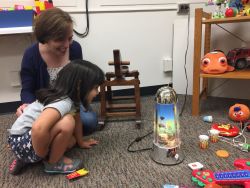Breadcrumb
- Home
- Research
Research
Main navigation
Our research questions
Professor Grazyna Kochanska established her laboratory at the University of Iowa in 1991 to study social and emotional development of children from infancy to adolescence. The overarching goal of our team’s research is to promote children’s positive, adaptive pathways of socioemotional development. We study factors that help children embark on positive developmental paths toward prosocial, internalized, self-regulated, rule-abiding conduct, and social competence.

Our broad research program addresses a variety of fascinating questions about children and families. For example, how and when do young children develop a capacity to comply with caregivers’ requests and prohibitions? How early can they appreciate and embrace parental rules and standards of behavior? How and when do they begin to be able to regulate their own behavior at will, resist temptations, wait patiently when necessary, show regard for rules and inhibit prohibited actions even when unsupervised, and engage in prosocial, desirable behavior? How and when do they come to experience positive social emotions, such as empathy and sympathy? How and when do they begin to experience discomfort when they misbehave?

To understand those processes, we study many aspects of young children’s lives. For example, we explore many characteristics of the parent-child relationship, starting early in infancy, when the child and parent begin to form their bond. We also examine how parents discipline and control their young children, how parents and children interact and communicate, and how they navigate together developmental challenges of infancy, toddler and preschool age, and beyond.
We also study biologically-based differences in children’s temperaments. Even as infants, children have very different, unique individualities, and unique emotional response styles. We examine how those differences relate to their genetic characteristics and to their parents’ personalities and caregiving styles. We are also interested in aspects of the family life, for example, experiences of stressful events that affect the family or the parents’ interactions with each other.
Our research methods

Our typical approach involves longitudinal research, which entails following children and their parents over a period of several years to understand continuities and changes over time. Our methods involve extensive observations: We observe children and parents in enjoyable, naturalistic situations in their homes and in the laboratory. Children participates in many games designed to capture individual differences in many personality characteristics, for example, in their abilities to wait, to slow down, to pay attention, and to follow rules. We also conduct interviews with parents and children and obtain questionnaire data. On occasion, we also collect biological data related to children’s individual temperaments and emotional responses. Those may involve collecting saliva samples or cheek swabs, or measurement of skin conductance using sensors placed on the child’s hands.
Our utmost goal is to assure that our participants feel appreciated, comfortable, and relaxed, and that they look forward to their visits. Our staff members are trained to provide participants with enjoyable and educational experiences. The laboratory setting is safe and comfortable. Participants are paid for their time and effort.